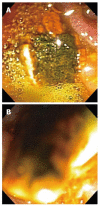Role of endoscopic ultrasound/SpyScope in diagnosis and treatment of choledocholithiasis in pregnancy
- PMID: 20653072
- PMCID: PMC2909563
- DOI: 10.3748/wjg.v16.i28.3601
Role of endoscopic ultrasound/SpyScope in diagnosis and treatment of choledocholithiasis in pregnancy
Abstract
Cholelithiasis and choledocholithiasis occur frequently in pregnancy and their management can be complicated. Traditional endoscopic retrograde cholangiopancreatography (ERCP) is the first line treatment for choledocholithiasis, but in addition to its baseline risks, fluoroscopy poses an additional radiation risk to the fetus. Endoscopic ultrasound (EUS) is an accurate modality for detecting common bile duct stones, but its role has not been defined in pregnancy. We describe an alternative management strategy to conventional ERCP in a pregnant patient with choledocholithiasis and cholangitis detected using EUS and choledochoscopy.
Figures
Comment on
-
Management of pancreaticobiliary disease using a new intra-ductal endoscope: the Texas experience.World J Gastroenterol. 2009 Mar 21;15(11):1353-8. doi: 10.3748/wjg.15.1353. World J Gastroenterol. 2009. PMID: 19294765 Free PMC article.
References
-
- Ko CW, Beresford SA, Schulte SJ, Matsumoto AM, Lee SP. Incidence, natural history, and risk factors for biliary sludge and stones during pregnancy. Hepatology. 2005;41:359–365. - PubMed
-
- Jamidar PA, Beck GJ, Hoffman BJ, Lehman GA, Hawes RH, Agrawal RM, Ashok PS, Ravi TJ, Cunningham JT, Troiano F. Endoscopic retrograde cholangiopancreatography in pregnancy. Am J Gastroenterol. 1995;90:1263–1267. - PubMed
-
- Simmons DC, Tarnasky PR, Rivera-Alsina ME, Lopez JF, Edman CD. Endoscopic retrograde cholangiopancreatography (ERCP) in pregnancy without the use of radiation. Am J Obstet Gynecol. 2004;190:1467–1469. - PubMed
Publication types
MeSH terms
LinkOut - more resources
Full Text Sources
Medical


